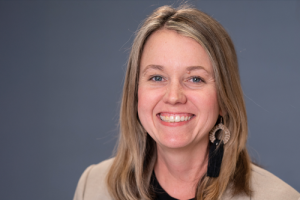Cancer Advocacy Fueled by Education and Personal Experience
Published July 23, 2025
 If you are looking for Ginger Blackmon on a summertime weekend, you likely will find her on her beloved Jacksonville Beach in Florida. To those passing by, it may appear as if she is relaxing, but on the inside, her thoughts often churn up waves of ideas on how she can help the greater good – particularly in the oncology space.
If you are looking for Ginger Blackmon on a summertime weekend, you likely will find her on her beloved Jacksonville Beach in Florida. To those passing by, it may appear as if she is relaxing, but on the inside, her thoughts often churn up waves of ideas on how she can help the greater good – particularly in the oncology space.
Blackmon is an oncology pharmacist and two-time cancer survivor, working as the Associate Director of Clinical Initiatives at the nonprofit organization Network for Collaborative Oncology Development & Advancement. While at NCODA, she completed the MA in Nonprofit Management program at Johns Hopkins University in May of 2025.
“I am so grateful that NCODA covered all of my tuition for the program as an employee benefit,” said Blackmon, who has also ventured to East Africa on medical missions eight times over the past decade. She has a planned trip to Peru in the fall to lend her expertise to a mobile medical clinic. “They saw the Hopkins program as valuable for my continued growth in the organization.”
Blackmon admittedly digs deep into her personal experience to improve the circumstances of current cancer patients. Shortly after completing pharmacy school at Mercer University, she was diagnosed with lymphoma at age 23. At age 27, the cancer recurred, and Blackmon underwent a successful bone marrow transplant using her own stem cells in 2007. She thankfully has been “free and clear” of cancer ever since.
At NCODA, Blackmon supports a global network that has grown to over 12,000 members – including pharmacists, physicians, nurses, pharmacy technicians, and other support staff that comprise oncology care teams. The organization serves academic medical centers, health systems, and community oncology groups, all with medically integrated pharmacies as part of their practices. The company works to provide resources and to address policy issues around drug therapy management, creates patient education sheets, and presents educational webinars on emerging drugs and operational topics.
Blackmon’s responsibilities include working on clinical resources and overseeing a pharmacist fellowship program. She also produces a podcast that features compelling conversations with clinical and administrative leaders in oncology who share their expertise on key industry topics and discuss the value of Positive Quality Interventions in enhancing patient care. The podcast offers a unique blend of clinical insight, professional development, and human connection to improve patient outcomes and to stay current on ever-changing oncology advances and on personalized care that sustains patients throughout their cancer journeys.
“We are making strides through things like CAR-T Cell Therapy,” she said. “Multiple myeloma used to be a death sentence and is now becoming more of a chronic disease that can be managed. There have been great results in treating lymphomas with patients using their own stem cells to attack cancer. Immunotherapy treatments in patients with stage-four cancers are extending lives. The science is really interesting and promising and changes every day.
“My journey at Johns Hopkins was definitely inspiring,” Blackmon continued. “I learned new things every week, and I took a lot away from all the case studies that we reviewed. It was a great program that introduced me to instructors and classmates from very different areas of the country with very different experiences and nonprofit interests. We were a diverse group.”
Her role as a pharmacist gives Blackmon an up-close look at how NCODA is filling a necessary gap in the oncology field. Her takeaways from the Hopkins program have equipped her with both the passion and the practical knowledge to perhaps fulfill a personal dream of her own.
Blackmon hopes to draw on the information that she acquired at Johns Hopkins to address a gap in the cancer survivorship realm and to team with her husband, a police officer turned oncology nurse, to create a small nonprofit of her own. She envisions the creation of an organization that would use water activities and experiences – think surfing, kayaking, fishing, and even an energy-filled, water-themed event on the beach – to improve the mental health of cancer survivors. Or maybe, she ponders, she could create an Airbnb or a bed and breakfast to accommodate cancer survivors for a free stay and a much needed respite.
“I think it would be hugely fulfilling to create a nonprofit to help other people who are going through the same thing that I went through,” she said. “Because cancer touches so many people, there are still gaps in addressing patient needs, and someone has to do something about them. I just love the mission-based philosophy of nonprofits, and I think it would really fill my tank to create these experiences, to have these patient interactions, and to take the experience that I have through my work at NCODA and my Hopkins degree to serve my community – a community of cancer patients and survivors.”
Attention: Students and Alumni
Are you a current AAP student or alumni and want to share your accomplishments?
Interested in pursuing a graduate degree at Johns Hopkins University?
Request information to learn more or apply here.